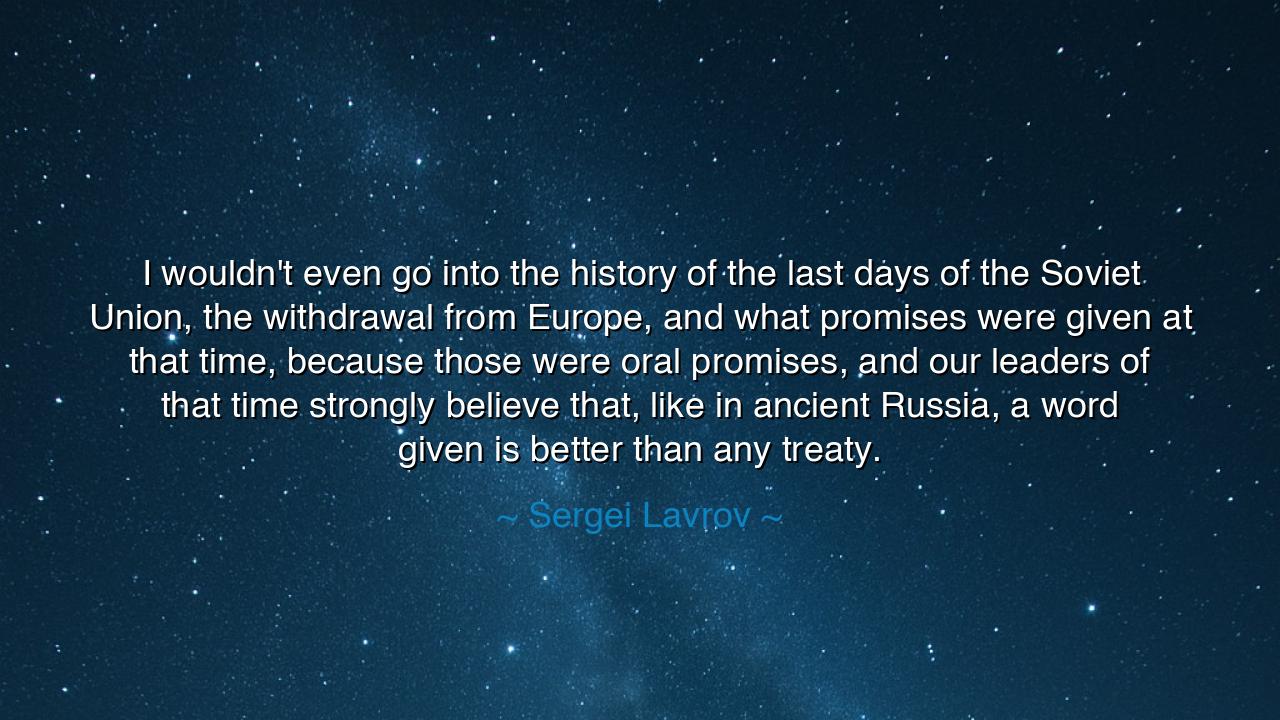
I wouldn't even go into the history of the last days of the
I wouldn't even go into the history of the last days of the Soviet Union, the withdrawal from Europe, and what promises were given at that time, because those were oral promises, and our leaders of that time strongly believe that, like in ancient Russia, a word given is better than any treaty.






“I wouldn’t even go into the history of the last days of the Soviet Union, the withdrawal from Europe, and what promises were given at that time, because those were oral promises, and our leaders of that time strongly believe that, like in ancient Russia, a word given is better than any treaty.” — Sergei Lavrov
Listen, O children of nations, and weigh carefully the words of Sergei Lavrov, the diplomat and voice of Russia in an age of shifting powers. In this saying, he speaks not only of politics, but of the moral fabric that binds words to deeds. He evokes a world long gone, a time when the promise of a man was not a convenience of speech, but a sacred bond. When Lavrov recalls that “a word given is better than any treaty,” he mourns the loss of that ancient honor, when truth was pledged not on parchment but upon the soul itself. He contrasts this spirit of old with the distrust of modern diplomacy, where words are weighed, twisted, and forgotten the moment they leave the lips of those who speak them.
The origin of these words lies in the bitter memory of the collapse of the Soviet Union, that great unraveling at the end of the twentieth century. As the empire withdrew from Eastern Europe and the Cold War’s frost began to thaw, Russia’s leaders were told—so it is claimed—that NATO would not expand eastward. Yet those promises, Lavrov reminds us, were “oral”—spoken but unwritten, given in the warmth of meetings, yet never sealed in the ink of treaties. To the leaders of that time, trained in the traditions of an older Russia, such promises were enough. They believed that a pledged word carried the weight of law, that honor was stronger than any document. But as history unfolded, the maps of Europe changed, and those words—those once-sacred assurances—were left to the winds of politics.
In ancient Russia, as in many lands of old, the spoken word was indeed sacred. Princes sealed their alliances not with signatures, but with oaths before God and their people. A lie uttered in public was a wound to one’s honor, a stain that could not be washed away. To break one’s word was to betray not only the other, but one’s own name and lineage. Such was the ancient code of honor, known to knights, warriors, and chieftains across the world—that trust is the first law of civilization. Where written laws are weak, the moral word becomes the foundation of all. But where that foundation crumbles, treaties become meaningless scrolls, and diplomacy turns to theater.
Lavrov’s lament, then, is not only for a political loss, but for a spiritual decline. He points to an age when nations and men believed that truth spoken had binding power. Now, in the modern world, every utterance is guarded by lawyers, every promise shadowed by suspicion. The word has become cheap, the treaty a tool of convenience. Thus, his statement carries a deeper sorrow: that between nations, as between men, faith has withered, replaced by calculation. The ancients trusted the bond of honor; the moderns trust only the contract. And yet, the world built on contracts without trust is a house built on sand.
Consider the story of Pericles of Athens, who once said that “the secret of freedom is courage, and the secret of courage is wisdom.” When the Athenians broke faith with their allies and twisted their words for gain, their empire soon fell. Their treaties did not save them; their armies could not defend the trust they had lost. So too in every age, whether in Greece or Russia, Rome or the modern West, the breaking of one’s word corrodes the heart of nations. For trust, once betrayed, is not easily restored.
The lesson, then, is this: guard the sanctity of your word, whether as a person or as a people. A promise is not merely sound; it is a reflection of the soul. Speak not lightly, for every word binds you to the truth or brands you with falsehood. Be cautious in pledging, but once you have pledged, stand firm as stone. For when the world forgets that a word given is sacred, chaos reigns, and even treaties written in gold will crumble into dust.
So remember, O listener, the wisdom of Lavrov’s reflection: the honor of speech is the true measure of civilization. Let not the tongues of men become as the wind—shifting, uncertain, and without meaning. Build your life, your friendships, your nations upon trust that is spoken and kept. For the day will come when all treaties are forgotten, all empires are gone, and only the memory of your word—kept or broken—will remain.






AAdministratorAdministrator
Welcome, honored guests. Please leave a comment, we will respond soon